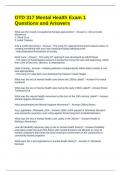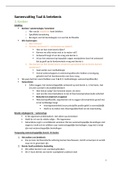-
1. Exam (elaborations) - Exam 1 otd 457 questions with correct answers
-
2. Exam (elaborations) - Exam 3 otd 540 questions and answers
-
3. Exam (elaborations) - Occupational therapy final exam questions and answers
-
4. Exam (elaborations) - Ot comprehensive exam prep questions and answers
-
5. Exam (elaborations) - Otd 302 class exam questions with correct answers
-
6. Exam (elaborations) - Otd 302 exam 2 study guide questions with correct answers
-
7. Exam (elaborations) - Otd 302 exam ii practice questions with latest update
-
8. Exam (elaborations) - Otd 306 exam review questions and answers
-
9. Exam (elaborations) - Otd 306 final exam questions with latest update
-
10. Exam (elaborations) - Otd 306 final exam study questions with answers
-
11. Exam (elaborations) - Otd 314 week 1, 2, & 3 exam questions with latest update
-
12. Exam (elaborations) - Otd 316 final exam questions with latest update
-
13. Exam (elaborations) - Otd 316 midterm exam questions and answers
-
14. Exam (elaborations) - Otd 317 exam 2-assessments and practice exam questions and answers
-
15. Exam (elaborations) - Otd 317 exam one questions with correct answers
-
16. Exam (elaborations) - Otd 317 exam two questions with complete solutions
-
17. Exam (elaborations) - Otd 317 mental health exam 1 questions and answers
-
18. Exam (elaborations) - Otd 324 - final exam questions with complete solutions
-
19. Exam (elaborations) - Otd 324 kinesiology exam 1 questions and answers
-
20. Exam (elaborations) - Otd 333 exam 2 questions and answers
-
21. Exam (elaborations) - Otd 334 exam 1 questions with complete solutions
-
22. Exam (elaborations) - Otd 341 exam 3 questions and answers
-
23. Exam (elaborations) - Otd 341 neuro exam 1 questions and answers
-
24. Exam (elaborations) - Otd 341 neuroanatomy test 1 exam questions with complete solutions
-
25. Exam (elaborations) - Otd 355 - exam 2 cumulative questions with correct answers
-
26. Exam (elaborations) - Otd 355 exam 1 questions and answers
-
27. Exam (elaborations) - Otd 355 exam one questions with correct answers
-
28. Exam (elaborations) - Otd 355 final exam questions and answers
-
29. Exam (elaborations) - Otd 356 exam 2 questions and answers
-
30. Exam (elaborations) - Otd 356 exam two questions with correct answers
-
31. Exam (elaborations) - Otd 417 exam 1 public policies for people with disabilities questions and answers
-
32. Exam (elaborations) - Otd 417 exam 1 questions and answers latest update
-
33. Exam (elaborations) - Otd 417 exam 2 part 2 questions with latest update
-
34. Exam (elaborations) - Otd 423 elders exam 1 questions and answers
-
35. Exam (elaborations) - Otd 423 exam 1 questions with latest update
-
36. Exam (elaborations) - Otd 423 exam 1 questions with verified answers
-
37. Exam (elaborations) - Otd 423 exam 2 questions with verified answers
-
38. Exam (elaborations) - Otd 433 exam 1 questions and answers
-
39. Exam (elaborations) - Otd 433 exam 1 questions and answers
-
40. Exam (elaborations) - Otd 433 pams comprehensive exam questions with correct answers
-
41. Exam (elaborations) - Otd 433 ue evaluation & intervention exam questions and answers
-
42. Exam (elaborations) - Otd 435 exam 1 questions with correct answers
-
43. Exam (elaborations) - Otd 435 exam 2 questions with latest update
-
44. Exam (elaborations) - Otd 435 final exam questions and answers
-
45. Exam (elaborations) - Otd 500 exam 1 questions and answers
-
46. Exam (elaborations) - Otd 640 final exam questions with verified answers
-
47. Exam (elaborations) - Otd 703 practice questions exam 1 questions and answers
-
48. Exam (elaborations) - Otd 6311 - final exam questions and answers
-
49. Exam (elaborations) - Otd 6430 final exam questions with latest update
-
50. Exam (elaborations) - Otd anatomy test 1 exam questions and answers
-
51. Exam (elaborations) - Otd comprehensive exam (6110 ot foundations) questions and answers
-
52. Exam (elaborations) - Otd exam prep questions with latest update
-
Show more





